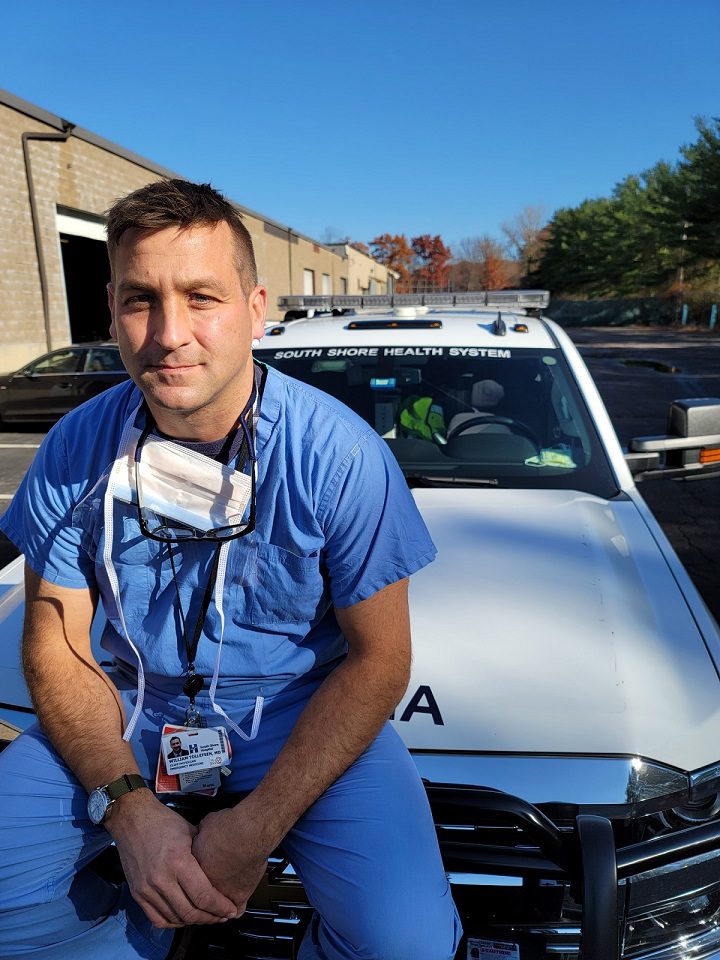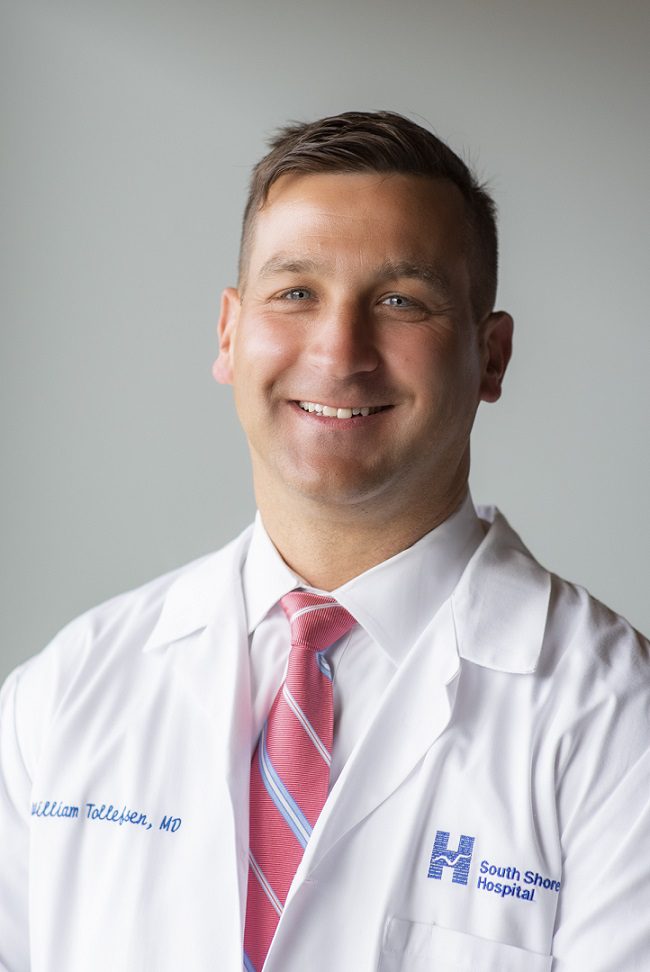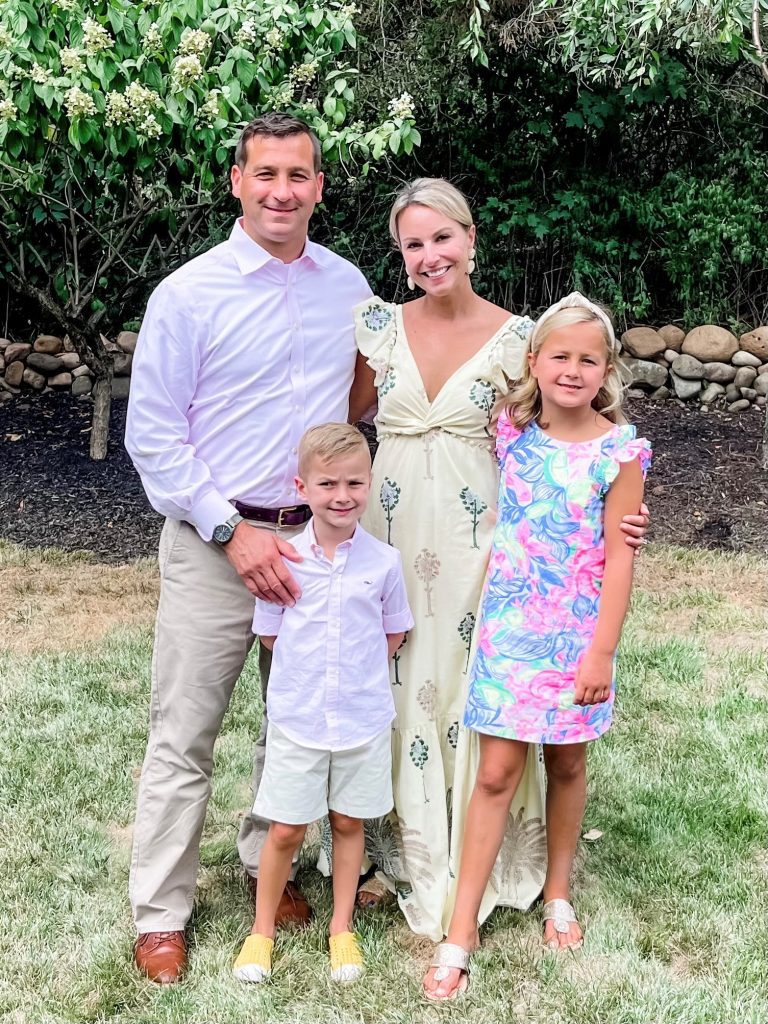
August 31, 2023 By Carol Britton Meyer
South Shore Hospital launched its highly-successful Mobile Integrated Health program in early 2020 — coincidentally, just prior to the arrival of the pandemic.
“During this time, nobody wanted to go to a hospital, so we were able to care for patients in their homes, which also created capacity for those who needed ventilators and other emergency care,” South Shore Health EMS and MIH Medical Director William Tollefsen, MD, told the Hingham Anchor. He and his family reside in Hingham.
Beyond Covid, the MIH program soon proved to be ideally suited to delivering safe and cost-effective hospital-level care to meet patients’ needs in the comfort of their own homes, thereby avoiding the need for an emergency department visit or hospitalization in many cases.

The program is designed to treat patients with chronic conditions and those who have been admitted to the hospital for acute care and treatment who can safely continue their recovery at home.
Medical services are provided by specially-trained MIH paramedics, including acute, skilled nursing, and post-operative care, building upon already-established relationships with existing providers and programs.
“This is not a service of convenience,” Tollefsen said. “Eligible patients with acute medical issues are referred to the program by healthcare providers, primary care doctors, visiting nurses, and hospital physicians.” A patient’s care is transferred back to their primary care doctor once their condition is stabilized.
MIH, part of South Shore Health, also works with community physicians and other organizations such as Norwell Visiting Nurse Association and Linden Ponds to coordinate patients’ care.
This program has proved to be highly successful. “Patient surveys indicate an almost 100 percent satisfaction rate,” Tollefsen said. “Who wouldn’t rather be at home with a paramedic administering the same medications as they would have received sitting in a hospital?”

‘Novel way to deliver care’
Tollefsen, who was at the forefront of launching this successful hospital-based EMS system, recently shared the details with the Hingham Anchor.
“This is a novel way to deliver care, leveraging the clinical acumen and procedural skills of paramedics in non-emergency situations while also closing gaps and disparities in care in our community. We’re uniquely positioned at South Shore Health with our hospital-based EMS system,” he said.
This is how the program works — At the request of a patient’s PCP or care team, a specially-trained MIH paramedic is dispatched to their home for a same-day evaluation. The paramedic then communicates via telehealth technology with an MIH provider, who may order labs, medications, or other services.
MIH paramedics make daily visits to patients’ homes, arriving with fully-outfitted trucks carrying all the necessary medical equipment and a supply of medications to check their vital signs and coordinate their care with MIH physicians and providers.
Depending on the circumstances, paramedics may be directed to conduct lab or blood work, administer IV fluids, or administer medications at the direction of the MIH provider.
While enrolled in the program, patients are monitored remotely by their care team — which, depending on their needs — could also include nurses, a physical therapist and/or an occupational therapist.
Patients are required to remain resting at home 24/7 while enrolled in the MIH program, just as if they were in a hospital.

Leverages power of entire health system
A key benefit to patients is that MIH leverages the power of the entire health system — including primary care, cardiovascular care, EMS, urgent care, and behavioral health care — to provide a safety net for patients with chronic health issues. “It’s a team approach,” Tollefsen said.
MIH also eliminates the need for patients and families to travel to the hospital, working around visitation restrictions, and helps them avoid costs associated with moving between phases of care — from home to the ER, relocating from one hospital floor to another, and discharge from the hospital back home.
The program has its roots 12 years ago when Tollefsen was medical director for a Cambridge ambulance service. “We were having paramedics make follow-up phone calls to patients and others at risk and realized we could make an impact on their care by using paramedics in a non-emergency setting,” he recalled. “It took eight years for passage of a new law in Massachusetts allowing paramedics to perform this service. It was a natural fit for South Shore Health, which has its own EMS division, to develop its own MIH program. It’s the first health system-based MIH program in the state.”
Tollefsen graduated from New York Medical College and completed residency training in Emergency Medicine at Harvard University, Brigham and Women’s, and Massachusetts General Hospital.
He completed an MBA at the Isenberg School of Management at UMASS Amherst and holds a Master of Medical Science degree from the Boston University School of Medicine.
Tollefsen is also the chief medical officer of South Shore Health Express, a chain of urgent care facilities operated by South Shore Health. He also serves as medical director for state OEMS (Office of Emergency Medical Services) Region IV, serving 61 cities and towns of the Metro-Boston EMS Council. As the current EMS Medical Director for eight municipal and three private ambulance services on the South Shore, Tollefsen interacts with and provides oversight for more than 400 paramedics.
When the Derby Street Shops fatal crash occurred last November, South Shore Health EMS was the first mutual aid service to be contacted. “Emergency aid agencies from the entire area were there,” Tollefsen recalled. “I also responded at the scene and worked with Fire Chief Steve Murphy to establish an EMS command.”
Tollefsen and his family moved to Hingham in 2015. He and his wife, Kylle, have two children who are enrolled at South Elementary School. “We love being part of this seaside community in close proximity to Boston, where my wife works,” he said.
“Our family enjoys sailing in Hingham Harbor and around the Harbor Islands, hiking and enjoying the outdoors together, and skiing in the winter.”

